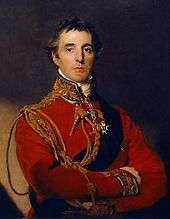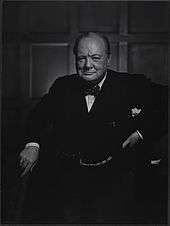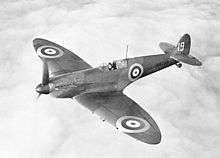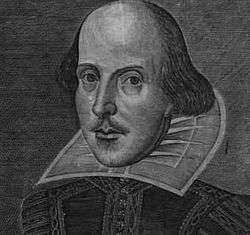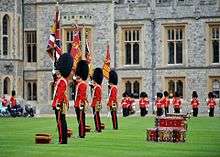List of cultural icons of England
| Culture of England |
|---|
 |
| History |
| People |
| Languages |
|
Traditions |
|
Mythology and folklore
|
| Cuisine |
| Religion |
| Art |
| Literature |
|
Music and performing arts
|
|
Media
|
|
Monuments |
|
This list of cultural icons of England is a list of people and things from any period which are independently considered to be cultural icons characteristic of England.
This is a dynamic list and may never be able to satisfy particular standards for completeness. You can help by expanding it with reliably sourced entries.
Animals

Suffolk Punch horses
- Dartmoor pony.[1]
- Exmoor pony.[2]
- Gloucester Old Spot pig.[3]
- Hereford cattle.[4]
- New Forest Pony.[5]
- Norfolk turkey.[6]
- Old English sheepdog.[7]
- Suffolk Punch horse.[8]
Art
- William Blake (1757-1827).[9]
- John Constable (1776-1837);[10] in particular, The Hay Wain.[11]
- George Cruikshank (1792–1878).
- Thomas Gainsborough (1727-1788).[12]
- James Gillray (1756/1757-1815).
- William Hogarth (1697-1764).[13]
- Hans Holbein (c. 1497-1543);[14] in particular, his Portrait of Henry VIII[11] (destroyed by fire in 1698).
- L. S. Lowry (1887-1976).[11]
- Henry Moore (1898-1986).[11]
- Sir Joshua Reynolds (1723-1792).[15]
- J. M. W. Turner (1775-1851).[16]
- Joseph Wright of Derby (1734-1797).[17]
Books and documents
- The King James Bible (begun 1604; completed 1611).[11]
- The Bill of Rights 1689 (passed on 16 December 1689).[18]
- The Canterbury Tales (produced between c. 1386 and 1400) by Geoffrey Chaucer.[19]
- The Domesday Book (completed 1086).[11]
- William Shakespeare's First Folio (published posthumously in 1623).[20]
- The Lindisfarne Gospels (produced c. 700 A.D.), attributed to Eadfrith of Lindisfarne.[11]
- The Lord of the Rings (begun 1937; completed 1949), by J. R. R. Tolkien.[11]
- Magna Carta (agreed by King John on 15 June 1215).[11]
- Mrs Beeton's Book of Household Management (1861), edited by Isabella Beeton.[11]
- The novels of Charles Dickens (1812-1870).[11]
- On the Origin of Species (1859) by Charles Darwin.[11]
- Our Island Story (1905) by H. E. Marshall.[21]
- The Oxford English Dictionary (begun 1857; first edition completed 1928).[11]
- Pride and Prejudice (1813) by Jane Austen.[11]
- The works of Beatrix Potter (1866-1943).[11]
Buildings and structures

Big Ben, a.k.a. the Elizabeth Tower

The Tower of London
- The Abbey Road zebra crossing, famous for its association with the Beatles' 1969 album Abbey Road.[22]
- The Angel of the North, contemporary sculpture by Sir Antony Gormley, located near Gateshead in Tyne and Wear (completed 1998).[23][24][25]
- Big Ben (the nickname for the bell; the clock tower of the Houses of Parliament was renamed the Elizabeth Tower in 2012).[26]
- Blackpool Tower (opened 14 May 1894).[27]
- Buckingham Palace, London residence of the British monarch since 1837.[28]
- Canterbury Cathedral (founded 597; completely rebuilt 1070-1077; east end enlarged early 12th century, and largely rebuilt in Gothic style following a fire in 1174).[29]
- Durham Cathedral, formally the Cathedral Church of Christ, Blessed Mary the Virgin and St Cuthbert of Durham (present cathedral founded 1093).[30]
- EMI's Old Vinyl Factory in Hayes, Middlesex, where records by The Beatles and other EMI artists were manufactured in the 1960s and after.[31]
- Globe Theatre (the modern reconstruction, named "Shakespeare's Globe", opened in 1997 approximately 750 feet [230 m] from the site of the original[s]; the second Globe was pulled down 1644-45).[11]
- Hadrian's Wall (begun in 122 A.D.).[11]
- The Iron Bridge, across the River Severn in Shropshire (opened 1781).[11]
- The National Memorial Arboretum, described by Prince William in 2011 as an "iconic focal point" for the nation's remembrance of fallen soldiers.[32]
- Seaside piers (first built early 19th century).[11]
- The Shaftesbury Memorial Fountain, commemorating Lord Shaftesbury; the statue of Anteros is named The Angel of Christian Charity.[33]
- Spaghetti junction, or Gravelly Hill Interchange; opened 24 May 1972.[34]
- Stonehenge, a prehistoric ring of standing stones in Wiltshire.[28]
- Tower of London, officially Her Majesty's Royal Palace and Fortress of the Tower of London (the White Tower built 1078; expanded in the 12th & 13th centuries).[11]
- Westminster Abbey, formally the Collegiate Church of St Peter at Westminster (construction of the present church began 1245).[11]
- York Minster, formally the Cathedral and Metropolitical Church of Saint Peter in York (long history; the cathedral was declared complete and consecrated 1472).[11]
Clothing
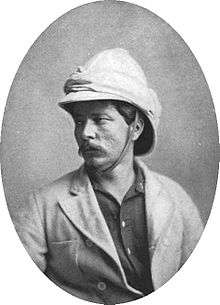
Henry Morton Stanley wearing a pith helmet
- Blazer, originated with the red 'blazers' of the Lady Margaret Boat Club (1825), the rowing club of St. John's College, Cambridge.[35]
- Bowler hat, created 1849 for soldier and politician Edward Coke.[30]
- Deerstalker hat, popularly associated with representations of fictional private investigator Sherlock Holmes.[36]
- The tailless dinner jacket suit, the earliest recorded example of which was ordered by the Prince of Wales (later Edward VII) from Savile Row tailors Henry Poole & Co.[37]
- Flat cap, dating back to the 14th century in Northern England.[38]
- Frock coat, popularised by Prince Albert, consort to Queen Victoria.[39]
- Miniskirt, so-called since the 1960s, when it became associated with "Swinging London."[11]
- Pith helmet, popular from the 1870s with military personnel in the Tropics.[40]
- Ruff, formal neck-wear from the mid-sixteenth century to the mid-seventeenth century, following Elizabeth I's New Year's gift to her ladies in 1565.[41]
- Smock-frock, dating back to the early 18th century in the Midlands and Southern England.[42]
- Top hat, said to have caused a riot when John Hetherington first wore one in public on 15 January 1797.[43]
- Trench coat, the invention of which is claimed by both Burberry and Aquascutum.[44]
Customs and traditions
- Aunt Sally, traditional English game in which players throw sticks or battens at a model of an old woman's head, usually played in pub gardens and fairgrounds.[45]
- Beating the bounds, ancient custom still observed in some English parishes; members of a community walk the boundaries of the parish, usually led by church officials, to share the knowledge of where they lay, and to pray for protection and blessings for the lands.[46]
- Birdman Rally, flying; format originated in Selsey, West Sussex, 1971.[47]
- Britannia Coco-nut Dancers, a troupe of Lancastrian clog dancers who perform every Easter in Bacup, dancing 7 miles (11 km) across the town.[48]
- Coconut shy, traditional funfair and fête game consisting of throwing wooden balls at a row of coconuts balanced on posts; may have originated at the annual Pleasure Fair in Kingston, Surrey, 1867; probably derives from the game of Aunt Sally.[49]
- Cooper's Hill Cheese-Rolling and Wake, annual event held on the Spring Bank Holiday at Brockworth, near Gloucester.[50]
- Cotswold Olimpick Games, probably began 1622.[51]
- Egg-and-spoon race, earliest recorded example, 1894.[52]
- Gurning, rural English tradition of assuming a distorted facial expression.[53]
- International Birdman, flying competitions held in Bognor Regis and Worthing, West Sussex.[54]
- London Marathon, first run 29 March 1981.[55]
- Maypole dancing, found historically in England and in areas of Wales and Scotland under English influence.[56]
- Morris dancing, earliest known and surviving English written mention dated to 1448.[11]
- Nottingham Goose Fair, dates back more than 700 years.[57]
- Royal Maundy; small silver coins known as "Maundy money" ceremonially distributed as symbolic alms to elderly recipients by the Monarch or a royal official at a religious service in the Church of England, held on Maundy Thursday, the day before Good Friday.[58]
- Royal Shrovetide Football, played annually in Ashbourne, Derbyshire since c. 1667.[59]
- Shin-kicking: a combat sport that originated in England in the early 17th century; it involves two contestants attempting to kick each other on the shin to force their opponent to the ground.[60]
- Well dressing, summer custom practised in rural England in which wells, springs or other water sources are decorated with designs created from flower petals; most closely associated with the Peak District of Derbyshire and Staffordshire.[61]
- Wellie wanging, game originating from Upperthong, Holmfirth; competitors are required to hurl a Wellington boot as far as possible within boundary lines.[62]
Education
- Cambridge University, founded in 1209.[63]
- Charterhouse School, founded by Thomas Sutton in 1611.[64]
- Eton College, founded in 1440.[65]
- Grammar schools: selective tier of England's Tripartite System of state-funded secondary education between 1945 and the 1970s.[66]
- Harrow School, founded in 1572.[67]
- Oxford University, evidence of teaching since 1096.[68]
- Roedean School, founded in 1885.[69]
- Rugby School, founded in 1567.[70]
- Winchester College, established by William of Wykeham in 1382.[71]
Emblems
- John Bull, a national personification of the United Kingdom in general and England in particular, especially in political cartoons and similar graphic works; created by Dr John Arbuthnot and Alexander Pope in 1712.[72]
- English Oak, consequent upon the future King Charles II hiding from his Parliamentarian pursuers in the oak tree at Boscobel House, in 1650 during the English Civil War.[11][73]
- Flag of St George, dating from the Middle Ages; used as a component in the design of the Union Flag in 1606.[11][74]
- The Lion/Lion passant; evidence of a seal bearing two lions passant used by the future King John during the lifetime of his father, Henry II.[75]
- Remembrance poppy, used since 1921 to commemorate military personnel who have died in war; distributed by The Royal British Legion in the weeks leading up to Remembrance Sunday, in support of current and former British military personnel.[76]
- The Rose is the national flower of England, a usage dating back to the English civil wars of the 15th century.[11]
- Saint George, patron saint of England by the 14th century.[77]
Festivals

May day illustration by Kate Greenaway (1846-1901)
- Commonwealth Day: annual celebration of the Commonwealth of Nations held on the second Monday in March.[78]
- Saint George's Day: 23 April, the traditionally accepted date of Saint George's death in 303 AD.[79]
- May Day: usually celebrated on 1 May.[80]
- Empire Day (1904-1958): last school day before 24 May, Queen Victoria's birthday.[81]
- Whitsun: the festival of Pentecost, the seventh Sunday after Easter, which commemorates the descent of the Holy Spirit upon Christ's disciples (Acts of the Apostles, Chapter 2).[82]
- Trafalgar Day: 21 October, celebration of Nelson's victory over the combined French and Spanish fleets at the Battle of Trafalgar on 21 October 1805.[83]
- Boxing Day: 26 (or 27 when 26 is a Sunday) December.[84]
- Glastonbury Festival: performing arts festival that takes place near Pilton, Somerset; inaugurated in 1970.[11]
Fictional characters

Sherlock Holmes (played by Basil Rathbone)
- Biggles, nickname of pilot and adventurer James Bigglesworth, created in 1932 by Captain W. E. Johns.[85]
- James Bond, British Secret Service agent created in 1953 by Ian Fleming.[86]
- Dixon of Dock Green, typical "bobby" on the beat, first appeared in The Blue Lamp (1949).[87]
- Falstaff, fat, boastful knight who appears in three plays by William Shakespeare.[88]
- Alf Garnett, East End patriarch first seen in sitcom Till Death Us Do Part, created in 1965 by Johnny Speight.[89]
- Sherlock Holmes, private detective created in 1887 by Sir Arthur Conan Doyle.[90]
- Robin Hood, heroic outlaw of English folklore, dating from the 13th century.[11]
- Lord Snooty, comic strip character created in 1938 and drawn mostly by Dudley D. Watkins.[91]
- Noddy, little wooden puppet created in 1949 by Enid Blyton.[92]
- Paddington Bear, created by Michael Bond (b. 1926) in 1958.[93]
- Harry Potter, created by J. K. Rowling in 1997.[94]
- Rupert Bear, comic strip bear created in 1920 by Mary Tourtel and popularised from 1935 by Alfred Bestall.[95]
- Sooty, bear created by Harry Corbett in 1948.[96]
- Winnie-the-Pooh, created by A. A. Milne in 1926.[11]
Film

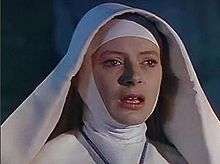
Deborah Kerr in Black Narcissus (1947)

- The Carry On films (1958-1978).[97]
- Ealing Comedies (1947-1957).[98]
- Hammer Horror (1950s-1970s).[99]
- Animal Farm (1954).
- Billy Liar (1963).[100]
- Black Narcissus (1947).[100]
- The Blue Lamp (1950).
- The Bridge on the River Kwai (1952).[100]
- Brief Encounter (1945).[100]
- Brighton Rock (1947).[101]
- A Canterbury Tale (1944).[100]
- The Dam Busters (1955).[102]
- Dead of Night (1945).[100]
- Dracula (1958).[100]
- The Entertainer (1960).[103]
- The Fallen Idol (1948).[100]
- The Four Feathers (1939).[104]
- Genevieve (1953).[105]
- Goodbye, Mr Chips (1939).[106]
- Great Expectations (1946).[100]
- The Halfway House (1944).[107]
- A Hard Day's Night (1964).[108]
- Henry V (1944).[109]
- Hobson's Choice (1954).[110]
- Holiday Camp (1947).[111]
- I Know Where I'm Going! (1945).[100]
- It Always Rains on Sunday (1947).[100]
- Kind Hearts and Coronets (1949).[100]
- A Kind of Loving (1962).[112]
- The Lady Vanishes (1938).[100]
- Lawrence of Arabia (1962).[100]
- The Life and Death of Colonel Blimp (1943).[100]
- Listen to Britain (1942).[100]
- The Loneliness of the Long Distance Runner (1962).[100]
- The Magic Box (1951).[113]
- A Man for All Seasons (1966).[114]
- The Man Who Could Work Miracles (1936).[115]
- A Matter of Life and Death (1946).[100]
- Oh, Mr Porter! (1937).[116]
- Oliver! (1968).[100]
- The Railway Children (1970).[100]
- Reach for the Sky (1956).[117]
- The Red Shoes (1948).[100]
- Richard III (1955).[118]
- Saturday Night and Sunday Morning (1960).[100]
- School for Scoundrels (1960).[100]
- Scrooge (1951).[119]
- The Servant (1963).[100]
- Theatre of Blood (1973).[100]
- Things to Come (1936).[120]
- The Third Man (1949).[100]
- The 39 Steps (1935).[100]
- The Titfield Thunderbolt (1953).[121]
- The Way to the Stars (1945).[122]
- Went the Day Well? (1942).[100]
- Zulu (1964).[100]
Folk tales
- Dick Whittington and His Cat: English folklore surrounding the real-life Richard Whittington (c. 1354–1423); earliest written form: 1604-5.[123]
- Goldilocks and the Three Bears: first recorded in narrative form by Robert Southey, 1837.[124]
- Humpty Dumpty: English nursery rhyme; character typically portrayed as an anthropomorphic egg, though not explicitly described so; first recorded versions date from the late 18th century.[125]
- Jack and the Beanstalk: "The Story of Jack Spriggins and the Enchanted Bean" appeared in 1734; "The History of Jack and the Bean-Stalk" published by Benjamin Tabart in 1807.[126]
- Jack the Giant Killer: "The History of Jack and the Giants" was published by J. White of Newcastle in 1711.[127]
- The Three Little Pigs: first appeared in The Nursery Rhymes of England by James Orchard Halliwell-Phillipps in c. 1886.[128]
- Tom Thumb: the tale of Tom Thumb is the first English fairy tale; the earliest surviving text (presumed to be by Richard Johnson) was printed in London in 1621.[129]
Food and drink
Main article: English cuisine
- Anglesey sea salt.[130]
- Bramley apple pie.[130]
- Cheddar cheese.[130]
- Cheshire cheese.[131]
- Cornish pasty.[130]
- Cottage loaf.[132]
- Cumberland sausage.[130]
- Cup of tea.[11][133][134][135]
- Fish & Chips.[11][136]
- Full English breakfast.[11]
- Lancashire hotpot.[137]
- Marmite.[11]
- The Pint.[11]
- Pork pie / Melton Mowbray pork pie.[130]
- Red Leicester cheese.[138]
- Roast beef and Yorkshire pudding.[11][139]
- Spotted dick.[140]
- Stilton cheese.[130]
- Worcester Sauce.[141]
- Sandwich.[142][143][144][145][146]
Military heroes
- Group Captain Sir Douglas Bader (1910-1982).[147]
- Group Captain Geoffrey Leonard Cheshire, Baron Cheshire VC, OM, DSO & Two Bars, DFC (1917-1992).[148]
- General John Churchill, 1st Duke of Marlborough (1650-1722).[149]
- Major General Robert Clive (1725-1774).[150]
- Oliver Cromwell (1599-1658).[151]
- Sir Francis Drake, Vice Admiral (c. 1540 - 1596).[152]
- Major General Charles George Gordon (1833-1885).[153]
- Sir Arthur Harris, 1st Baronet (1892-1984).[154]
- T. E. Lawrence (1888-1935).[155]
- Field Marshal Bernard Law Montgomery, 1st Viscount Montgomery of Alamein (1887-1976).[156]
- Horatio Nelson, 1st Viscount Nelson (1758-1805).[157]
- Arthur Wellesley, 1st Duke of Wellington (1769-1852).[158]
- Major General James Wolfe (1727-1759).[159]
Music

"Land of Hope and Glory" sheet music, 1902
Anthems
- "Heart of Oak" (the official march of the Royal Navy).[160]
- "I Vow to Thee, My Country".[161]
- "Jerusalem" ("And did those feet in ancient time . . .").[11][162]
- "Land of Hope and Glory".[163]
- "Rose of England".[164]
- "Rule, Britannia!"[165]
- "A Song of Patriotic Prejudice" by Flanders and Swann (with the refrain, "The English, the English, the English are best/I wouldn't give tuppence for all of the rest").[166]
- "There'll Always be an England".[167]
- "(There'll Be Bluebirds Over) The White Cliffs of Dover".[168]
Classical composers

Sir Edward Elgar, 1912
- Malcolm Arnold (1921-2006).[169]
- Benjamin Britten (1913-1976).[170]
- William Byrd (c. 1539/40 or 1543 – 1623).[171]
- Frederick Delius (1862-1934).[172]
- Edward Elgar (1857-1934).[173]
- George Frideric Handel (1685-1759; naturalised British 1727).[174]
- Gustav Holst (1874-1934).[175]
- Henry Purcell (1659-1695).[176]
- Arthur Sullivan (1842-1900); collaborated with librettist W. S. Gilbert.[177]
- John Tavener (1944-2013).[178]
- Michael Tippett (1905-1998).[179]
- William Walton (1902-1983).[180]
- Ralph Vaughan Williams (1872-1958).[181]
Conductors
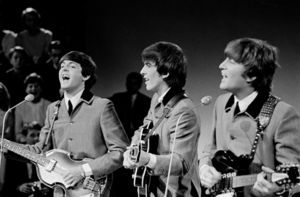
The Beatles, 1964

David Bowie, 1974
- John Barbirolli (1899-1970).[182]
- Thomas Beecham (1879-1961).[183]
- Adrian Boult (1889-1983).[184]
- Malcolm Sargent (1895-1967).[185]
- Leopold Stokowski (1882-1977, born in England).[186])[187]
Rock & Pop
- The Beatles.[188]
- Marc Bolan (1947-1977) and T-Rex.[189]
- David Bowie (1947-2016).[190][191]
- The Kinks.[192]
- Led Zeppelin.[193]
- Morrissey (b. 1959).[194]
- Pink Floyd and Syd Barrett (1946-2006).[195]
- Queen.[196]
- The Rolling Stones.[197]
- Sgt. Pepper's Lonely Hearts Club Band.[11]
- Sex Pistols.[198]
- The Who.[199]
Alternative/Independent
Orders, decorations, and medals
Main article: Orders, decorations, and medals of the United Kingdom
- British Empire Medal, awarded for meritorious civil or military service worthy of recognition by the Crown.[205]
- Distinguished Service Order (DSO), military decoration awarded for meritorious or distinguished service by officers of the armed forces during wartime, typically in actual combat.[206]
- George Cross, highest gallantry award for civilians, as well as for members of the armed forces in actions for which purely military honours would not normally be granted.[207]
- Order of the British Empire, includes OBE (Officer of the Most Excellent Order of the British Empire) and MBE (Member of the Most Excellent Order of the British Empire); rewards contributions to the arts and sciences, work with charitable and welfare organisations, and public service outside Her Majesty's Civil Service.[208]
- Victoria Cross, highest military decoration, awarded for valour "in the face of the enemy" to members of the armed forces of various Commonwealth countries, and former British Empire territories.[209]
Periodicals

The Times, 6 July 1863
- Country Life, launched by Edward Hudson in 1897.[210]
- Daily Mail, first published by Lord Northcliffe in 1896.[211]
- The Eagle, seminal comic published 1950-1969.[212]
- The Financial Times, founded by James Sheridan and Horatio Bottomley in 1888.[213]
- The Gentleman's Magazine, founded by Edward Cave in 1731.[214]
- The Lancet, weekly peer-reviewed general medical journal founded by Thomas Wakley in 1823.[215]
- Pall Mall Gazette, evening newspaper founded by George Murray Smith in 1865.[216]
- Philosophical Transactions of the Royal Society, scientific journal published by the Royal Society; established in 1665.[217]
- Private Eye, fortnightly satirical and current affairs magazine launched in 1961.[218]
- Punch, weekly magazine of humour and satire established by Henry Mayhew and engraver Ebenezer Landells in 1841.[219]
- The Times, daily national newspaper based in London; began in 1785 under the title The Daily Universal Register; became The Times on 1 January 1788.[220]
- Tit-Bits (a.k.a. Tit-Bits from all the interesting Books, Periodicals, and Newspapers of the World), weekly magazine founded by George Newnes in 1881.[221]
- Viz, adult comic magazine founded in 1979 by Chris Donald.[222]
Philosophers

John Locke, by Kneller
- Jeremy Bentham (1748-1832), founder of modern utilitarianism: that "it is the greatest happiness of the greatest number that is the measure of right and wrong".[223]
- Thomas Hobbes (1588-1679), wrote Leviathan (1651), the foundation of most later Western political philosophy.[224]
- John Locke (1632-1704), influential Enlightenment thinker, commonly known as the "Father of Liberalism".[225]
- John Stuart Mill (1806-1873), influential liberal thinker, wrote on social theory, political theory and political economy.[226]
- Bertrand Russell (1872-1970), logician, mathematician, and political activist.[227]
Politicians
- Clement Attlee (1883-1067), Labour.[228]
- Tony Benn (1925-2014), Labour.[229]
- Winston Churchill (1874-1965), Conservative.[230]
- Benjamin Disraeli (1804-1881), Tory/Conservative.[231]
- William Ewart Gladstone (1809-1898), Liberal.[231]
- Lord Liverpool (1770-1828), Tory/Conservative.
- William Pitt, 1st Earl of Chatham (1708-1778), Whig.
- William Pitt the Younger (1759-1806), Tory/Conservative.[232]
- Enoch Powell (1912-1998), Conservative.[233]
- Lord Salisbury (1830-1903), Tory/Conservative.
- Margaret Thatcher (1925-2013), Conservative.[234]
- Robert Walpole 1676-1745), Whig.[235]
Radio

BBC Radio logo
- The Archers, radio serial broadcast on BBC Radio 4 since 1951; originally described as "an everyday story of country folk".[236]
- BBC Radio, founded 1927.[237]
- BBC World Service, founded 1932.[238]
- Tony Blackburn, disc jockey, b. 1943.[239]
- Desert Island Discs, radio programme broadcast on BBC Radio 4; first broadcast in 1942.[240]
- Hancock's Half Hour, BBC radio comedy (later television comedy series), broadcast 1954-1961; the radio series broke with the variety tradition then dominant in radio comedy, highlighting a new genre: the sitcom, or situation comedy.[241]
- John Peel, disc jockey, 1939-2004.[242]
Religion
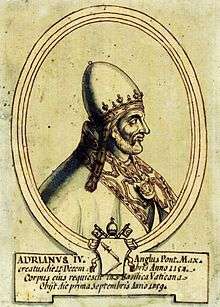
Pope Adrian IV / Nicholas Breakspear: the only English Pope
Main article: Religion in England
- Pope Adrian IV (Nicholas Breakspear, c.?1100 – 1159); the only English Pope, 1154-1159.[243]
- Saint Alban (died c. 209-305 A.D.); first recorded British Christian martyr.[244]
- Anselm of Canterbury (c. 1033 – 1109); Archbishop of Canterbury, 1093-1109.[245]
- Archbishop of Canterbury, senior bishop and principal leader of the Church of England.[246]
- Augustine of Canterbury (6th century), first Archbishop of Canterbury in 597 A.D.[247]
- Thomas Becket (c. 1120-1170), Archbishop of Canterbury from 1162 until his murder in 1170; venerated as saint and martyr by both Catholic Church and Anglican Communion; engaged in conflict with Henry II over rights and privileges of the Church and was murdered by followers of the king in Canterbury Cathedral; canonised soon after by Pope Alexander III.[248]
- The Venerable Bede (672/673-735); his Historia ecclesiastica gentis Anglorum earned him the title "The Father of English History".[249]
- Church of England, from 6th to 16th century in full communion with the See of Rome; the English Reformation saw a break from the authority of the Pope and the Roman Catholic Church.[250]
- Fidei defensor or "Defender of the Faith", a subsidiary title of English and later British monarchs since granted in 1521 by Pope Leo X to King Henry VIII.[251]
- Julian of Norwich (c. 1342 – c. 1416), English anchoress and important Christian mystic and theologian.[252]
- Thomas More (1478-1535), venerated by Catholics as Saint Thomas More (canonised 1535); author of Utopia (1516); his story is told in A Man for All Seasons (1966).[253]
- Cardinal Newman (1801-1890), beatified in 2010.[254]
- Post-Reformation oaths: English churchmen and others were required to assent to religious changes starting in the 16th century and continuing for more than 250 years.[255]
- Roman Catholic Relief Act 1829, culmination of the process of Catholic Emancipation.[256]
- The Salvation Army, founded by Catherine and William Booth, 1865.[257]
- John Wesley (1703-1791) and Charles Wesley (1707-1788), founders of Methodism.[258]
Royalty

Her Majesty, Queen Elizabeth II
- Alfred the Great (848-899 A.D.).[259]
- Richard the Lionheart (1157-1199).[260]
- Henry V (1386-1422).[261]
- Richard III (1452-1485).[262]
- Henry VIII (1491-1547).[263]
- Elizabeth I (1533-1603).[264]
- Caroline of Brunswick (1768-1821), Princess of Wales 1795-1820; wife of George IV 1820-1821.[265]
- Queen Victoria (1819-1901).[266]
- Elizabeth II (b. 1926).[267]
- Diana, Princess of Wales (née Spencer; 1961-1997).[268]
Scientists
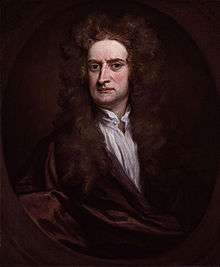
Sir Isaac Newton
- Francis Crick (1916-2004), co-discoverer (with James Watson) of the structure of the DNA molecule in 1953.[269]
- John Dalton (1766-1844), best known for his pioneering work in the development of modern atomic theory, and his research into colour blindness.[270]
- Charles Darwin (1809-1882), best known for his contributions to evolutionary theory.[271]
- Michael Faraday (1791-1867), discoveries include the principles underlying electromagnetic induction, diamagnetism, and electrolysis.[272]
- Francis Galton (1822-1911), devised a method for classifying fingerprints that advanced forensic science; initiated scientific meteorology; pioneered eugenics, coining the phrase "nature versus nurture".[273]
- Robert Hooke (1635-1703), natural philosopher and polymath of multiple innovations.[274]
- Edward Jenner (1749–1823), said to have "saved more lives [. . .] than were lost in all the wars of mankind since the beginning of recorded history."[275][276][277]
- Sir Isaac Newton (1642-1727), widely recognised as one of the most influential scientists of all time and a key figure in the scientific revolution.[278]
Sport
.jpg)

2012 Summer Olympics logo
- The 1966 FIFA World Cup Final: England 4 - West Germany 2; the most watched television event ever in the United Kingdom; Kenneth Wolstenholme's BBC TV match commentary drew to a close memorably with the line "They think it's all over".[279]
- Roger Bannister (b. 1929), ran the first sub-four-minute mile on 6 May 1954 at Iffley Road track in Oxford.[280]
- Henry Cooper (1934-2011), heavyweight boxer who held the British, Commonwealth, and European heavyweight titles several times throughout his career; knocked down Muhammad Ali (then Cassius Clay) in 1963.[281][282][283][284]
- Cricket;[11] in recent times, the 2005 Ashes series;[285] W. G. Grace (1848-1915), amateur cricketer, was important in the development of the sport.[286]
- Cyclists Chris Froome (b. 1985),[287] and Bradley Wiggins (b. 1980);[288] both victorious in the Tour de France.
- Notable Darts players include: Eric Bristow (b. 1957),[289] Keith Deller (b. 1959),[290] Maureen Flowers (b. 1945),[291] Bobby George (b. 1945),[292] John Lowe (b. 1945),[293] and Phil Taylor (b. 1960).[294]
- Football's FA Cup: first played during the 1871–72 season, it is the oldest association football competition in the world.[11]
- Bobby Moore (1941-1993), affectionately remembered captain of the England team that won the 1966 World Cup.[295]
- England's Premier League of men's association football clubs is the most-watched football league in the world, broadcast in 212 territories to 643 million homes and a potential TV audience of 4.7 billion people; after narrowly avoiding relegation the previous season, Leicester City F.C. won the league for the first time in their 132-year history in the 2015–16 season, becoming the sixth club to win the Premier League.[296]
- Rugby Football;[11] in recent times, Jonny Wilkinson's (b. 1979) dropped goal in the final minute of the 2003 Rugby World Cup Final.[297][298]
- Wimbledon[11] tennis champions include: Fred Perry (1909-1995),[299] and Virginia Wade (b. 1945).[300]
- Notable Snooker players include: Steve Davis (b. 1957),[301] Ronnie O'Sullivan (b. 1975),[302] and Jimmy White (b. 1962).[303]
- 2012 Summer Olympics, commonly known as London 2012.[304]
Television
Children's
- Gerry Anderson (1929-2012)[305] ITV productions including: Fireball XL5 (1962-5);[306] Stingray (1964-5);[307] Thunderbirds (1965-6);[308] Captain Scarlet (1967-8);[309] and Joe 90 (1968-9).[310]
- Blue Peter (BBC, 1958–present).[311]
- Jackanory (BBC, 1965-96).[312]
- Muffin the Mule (BBC, 1946–55).[313]
- Play School (BBC, 1964-88).).[314]
.jpg)
Reg Varney in On the Buses, 1972
- Smallfilms, the partnership of Oliver Postgate (1925-2008) and Peter Firmin (b. 1928),[315] makers of: Noggin the Nog (BBC, 1959–65);[316] The Clangers (BBC, 1969–74);[317] and Bagpuss (BBC, 1974).[318]
- Watch with Mother (BBC, 1953-1975),[319] including: Andy Pandy (1950–59);[320] The Flower Pot Men (1952-4);[321] The Woodentops (1955-7);[322] Camberwick Green (1966), Trumpton (1967), and Chigley (1969);[323] and Mr Benn (1971-2).[324]
- The Wombles (BBC, 1973-5).[325]
Comedy
- The Benny Hill Show (BBC/ITV, 1955-1991).[326]
- Fawlty Towers (BBC, 1975-9).[327]
- Monty Python's Flying Circus (BBC, 1969–74).[328]
- The Morecambe & Wise Show (BBC, 1968–77; ITV, 1978–83).[329]
- On the Buses (ITV, 1969–73).[330]
- Some Mothers Do 'Ave 'Em (BBC, 1973-8).[331]
Drama
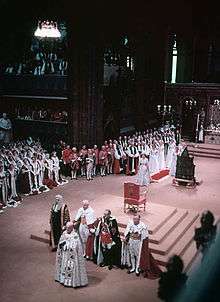
Coronation of Queen Elizabeth II, broadcast live on 2 June 1953
- Cathy Come Home and The Wednesday Play (1964-1970).[332][333]
- Coronation Street (ITV, 1960–present).[334]
- Dixon of Dock Green (BBC, 1955–76).[335]
- Doctor Who (BBC, 1963–89; 2005–present).[336]
- Play for Today (BBC, 1970–84).[337]
- Tales of the Unexpected (ITV, 1979–88).[338]
Other
- Match of the Day (BBC, 1964–present).[339]
- Panorama (1953–present).[340]
- Coronation of Queen Elizabeth II live broadcast (2 June 1953).[341]
- The Sky at Night (BBC, 1957–present).[342]
- Test Card F (BBC, 1967–99).[343]
- Top of the Pops (1964-2006).[344]
Transport
Cars
- Aston Martin, a manufacturer of luxury sports cars and grand tourers; associated since the 1960s with the fictional character James Bond following the use of a DB5 model in the 1964 film Goldfinger.[345]
- The Ford Cortina, built by Ford of Britain at Brentwood, Essex in various forms from 1962 to 1982.[346]
- The Jaguar E-Type, manufactured by Jaguar Cars between 1961 and 1975.[347]
- Land Rover, a car brand that specialises in four-wheel-drive vehicles; the Land Rover name was originally used, from 1948, by the Rover Company.[11]
- The Mini, made by the British Motor Corporation and its successors 1959-2000.[11]
- Morris Minor (1948-1971), recognised as typifying "Englishness".[348]
- Rolls-Royce Limited and Rolls-Royce Motors, renowned car-manufacturers 1906-1998; exemplified by the Rolls-Royce Silver Shadow;[11] and the associated Bentley (1919-1998; bought by Rolls-Royce in 1931).[349]
Water
- Cutty Sark (1869): a tea clipper built by 19th century ship-owning firm John Willis & Sons of London; in dry dock at Greenwich, London since 1954.[350]
- HMS Dreadnought (1906): a Royal Navy battleship that revolutionised naval power.[351]
- The Golden Hind: an English galleon best known for Sir Francis Drake's circumnavigation of the globe between 1577 and 1580;[352] the ship does not survive, but a replica - the Golden Hinde (1973) - has been berthed at St Mary Overie Dock on Cathedral Street, in Bankside, Southwark since 1996.
- The Mary Rose: King Henry VIII's warship sank on 19 July 1545 in the Solent, the straits north of the Isle of Wight; the wreck was rediscovered in 1971.[353]
- The Mayflower: the ship that transported the first English Separatists, known today as the Pilgrims, from Plymouth to the New World in 1620.[354]
- Narrowboats: the original working boats built in the 18th, 19th, and 20th centuries for carrying goods on England's narrow canals.[11]
- HMS Victory: best known as Lord Nelson's flagship at the Battle of Trafalgar in 1805; in dry dock at Portsmouth since 1922.[11]
Air
- The Avro Lancaster (1941-1963).[355]
- Concorde (1969-2003), jointly developed and manufactured by the British Aircraft Corporation and Aérospatiale under an Anglo-French treaty.[356]
- The de Havilland Comet (1949-1997), the first commercial jet airliner,[357] and the Vickers VC10 (1962-2013).[358]
- the Fairey Aviation Company (1915-1960).[348]
- The Hawker Siddeley Harrier (1969-2006).[348]
- The Sopwith Camel (1916-1920).[348]
- The Supermarine Spitfire (1936-1948)[359] and the Hawker Hurricane (1935-1944).[11]

Routemaster bus
Public transport
- Blackpool tramway, last surviving first-generation tramway in the United Kingdom.[30]
- British Railways, which from 1965 traded as British Rail; most nostalgically in the days of the steam locomotive.[360]
- The London Underground or the Tube; began operating in 1863.[361]
- Routemaster bus (red London double-decker bus), entered service 1956.[11][133]
- The man on the Clapham omnibus became the expression used in English courts to symbolise a hypothetical ordinary and reasonable person.[362]
Writers
- Middle English writers, notably: Geoffrey Chaucer (1343-1400),[363] and William Langland (c. 1332 – c. 1386).[364]
- Early modern dramatists, most notably: William Shakespeare (1564-1616).[365]
- Early modern poets, notably: John Donne (1572-1631),[366] and John Milton (1608-1674).[367]
- Augustan writers, notably: Alexander Pope (1688-1744),[368] and Dr Johnson (1709-1784).[369]
- Romantic poets, notably: Wordsworth (1770-1850),[370] Coleridge (1772-1834),[371] Byron (1788-1824),[372] Shelley (1792-1822),[373] and Keats (1795-1821).[374]
- Regency and Victorian female novelists, notably: Jane Austen (1775-1817),[375] Charlotte Brontë (1816-1855),[376] Emily Brontë (1818-1848),[377] and George Eliot (1819-1880).[378]
- Victorian novelists, most notably: Charles Dickens (1812-1870).[379]
- Victorian poets, notably: Tennyson (1809-1892),[380] and Browning (1812-1889).[381]
- Late 19th and early 20th century writers, notably: Thomas Hardy (1840-1928),[382] Rudyard Kipling (1865-1936),[383] and E. M. Forster (1879-1970).[384]
- 20th century novelists, including: George Orwell (1903-1950),[385] Evelyn Waugh (1903-1966),[386] and Graham Greene (1904-1991).[387]
- 20th century poets, including: Betjeman (1906-1984),[388] Auden (1907-1973),[389] and Larkin (1922-1985).[390]
Miscellaneous

Fox hunting, before the 2005 ban
- King Arthur, central figure in the legends making up the so-called Matter of Britain.[391]
- Bank of England, established 1694.[392]
- Bayeux Tapestry, final and best known work of Anglo-Saxon art, made in England in the 1070s but held in a French museum.[393]
- Betty's Tea Room in Harrogate, traditional tea rooms dating from 1919.[30]
- Blood Swept Lands and Seas of Red by Paul Cummins, with setting by Tom Piper; an installation at the Tower of London July–November 2014 commemorating the centenary of the outbreak of World War I.[394]
- The neighbourhood "bobby" on the beat, dating from the 19th century.[30]
- Boudica (d. A.D. 60 or 61), queen of the Celtic Iceni tribe who fought against the occupying forces of the Roman Empire.[395]
- Coldstream Guards and Trooping the Colour.[396]
- English eccentricity, some historical examples of which are documented in John Timbs' English Eccentrics and Eccentricities (1866).[11]
- The English garden, a style of "landscape" garden which emerged in England in the early 18th century.[11]
- English local government, originating from the municipal reform of the 19th century.[397]
- English sense of humour.[11]
- The E.U. membership referendum of 23 June 2016.[398]
- Fox hunting, of 16th century origin; and the 2005 ban (Hunting Act 2004).[11]
- Hedges.[11]
- Music hall, a theatrical entertainment popular from the early Victorian era until 1960;[399] popularly revived on television by the BBC's The Good Old Days.[400]
- Ordnance Survey maps; work commenced in 1791.[11]
- Oxbridge, a portmanteau word blending Oxford University and Cambridge University, used to refer to the two collectively in contrast to other universities.[11]
- Pantomime, a type of musical comedy stage production for family entertainment, developed in England by "father of English pantomime" John Rich (1692-1761).[11]
- The Parish church, the basic administrative unit of episcopal churches.[11]
- The public house, or Pub. The great diarist Samuel Pepys (1603-1733) described the pub as the heart of England.[11]
- Punch and Judy, traditional, popular puppet show, associated with seaside culture.[11][401][402]
- The Queen's head on postage stamps.[11][403] see also: the Chalon head.
- Queuing, the practice (once archetypally English) of waiting in line for one's turn to be attended to or to proceed.[11]
- Red pillar boxes (in use since 1852).[404]
- The Red telephone box, dating from 1924.[11]
- The Scout movement, created in 1907 by Lord Baden-Powell.[11]
- The seaside pleasure pier, first built in England in the early 19th century.[11]
- Stiff upper lip, a display of fortitude in the face of adversity, or an exercise of self-restraint in the expression of emotion;[11] exemplified in Rudyard Kipling's poem "If—".[405]
- The Sutton Hoo helmet, excavated in 1939 from a (c. 7th century) ship-burial and prompting comparisons with the world described in the heroic Old English poem Beowulf.[11]
- The London Tube Map, designed originally in 1931 by Harry Beck (1902-1974).[11]
- English weather.[11]
- The White Cliffs of Dover; of symbolic significance because they face Continental Europe across the narrowest part of the English Channel, where invasions have historically threatened, and against which the cliffs form a symbolic guard; because crossing at Dover was the primary route to the continent before the advent of air travel, the white line of cliffs also formed the first or last sight of England for travellers.[406]
References
- ↑ Wendy Buckingham. "Dartmoor pony under threat". Heart. Retrieved 16 February 2016.
- ↑ "Festival to celebrate an iconic pony of the Westcountry moors". Western Morning News. 2 July 2013. Retrieved 16 February 2016.
- ↑ "Orchard open day leaves visitors as happy as a pig in muck". The Cider Press. 2011. Retrieved 16 February 2016.
- ↑ "Hereford Cattle". Ridge Top Cattle. Retrieved 16 February 2016.
- ↑ Jolyon Attwooll (18 April 2013). "National Park focus: the New Forest". The Daily Telegraph. Retrieved 16 February 2016.
- ↑ Stephanie Brooks (4 April 2011). "Could Norfolk's favourite foods become protected?". Eastern Daily Press. Retrieved 13 June 2016.
- ↑ "Old English Sheepdog put on breed watch list". BBC News Online. 29 October 2012. Retrieved 16 February 2016.
- ↑ "West Suffolk: Revival of iconic Suffolk Punch continues". Ipswich Star. 8 April 2014. Retrieved 16 February 2016.
- ↑ "William Blake's Masterpieces at Metropolitan Museum". Art History News. 2013. Retrieved 29 February 2016.
- ↑ Martin Evans (28 June 2013). "Constable's The Hay Wain targeted by Fathers4Justice protester". The Daily Telegraph. Retrieved 29 February 2016.
- 1 2 3 4 5 6 7 8 9 10 11 12 13 14 15 16 17 18 19 20 21 22 23 24 25 26 27 28 29 30 31 32 33 34 35 36 37 38 39 40 41 42 43 44 45 46 47 48 49 50 51 52 53 54 55 56 57 58 59 60 61 62 63 64 65 66 67 68 69 "ICONS of England - the 100 ICONS as voted by the public". Culture24. Retrieved 21 June 2016.
- ↑ "Gainsborough". Tate. 2001. Retrieved 29 February 2016.
- ↑ "William Hogarth: Painter & Printmaker". Bristol City Museum and Art Gallery. 2015. Retrieved 29 February 2016.
- ↑ "Did Holbein invent Henry VIII?". BBC Worldwide. 16 February 2015. Retrieved 29 February 2016.
- ↑ "Birmingham Museum & Art Gallery acquires iconic Sir Joshua Reynolds work". ArtDaily. 2013. Retrieved 29 February 2016.
- ↑ "Turner & the Sea". Peabody Essex Museum. 2014. Retrieved 29 February 2016.
- ↑ "Joseph Wright of Derby, A.R.A.". Sotheby's. 2016. Retrieved 29 February 2016.
- ↑ "Bill of Rights 1689". Parliament of the United Kingdom. 2016. Retrieved 1 March 2016.
- ↑ "A Portrait of the Pardoner from Chaucer's Canterbury Tales". Three Gold Bees. 2016. Retrieved 1 March 2016.
- ↑ "British literary icons to be exhibited in China for the first time". British Library. 2015. Retrieved 1 March 2016.
- ↑ Tom Holland (2014). "Our Island Story: Not as Conservative as David Cameron imagines". The Guardian Online. Retrieved 1 March 2016.
- ↑ "Iconic Abbey Road crossing made famous by The Beatles awarded listed status". BBC News Online. 2010. Retrieved 21 March 2016.
- ↑ Guardian: Angel of the North. Retrieved 15 December 2012.
- ↑ Gateshead Council: Angel of the North an English Icon. Retrieved 15 December 2012.
- ↑ Future Matters: Cultural Regeneration. Retrieved 15 December 2012. "The development of cultural icons such as Sage, Baltic and The Angel of the North have shown that iconic projects can go a long way to improving external perceptions of an area, as well as providing environmental, economic and social benefits."
- ↑ McManus, Erwin Raphael (2001). An Unstoppable Force: Daring to Become the Church God Had in Mind. Flagship Church Resources. p. 113.
- ↑ "Blackpool Tower reopens to public after £20m restoration". BBC News Online. 2011. Retrieved 21 March 2016.
- 1 2 "Stonehenge, Buckingham Palace and iconic British landmarks to be renamed in Chinese in bid to attract more Asian tourists". Mail Online. Retrieved 21 June 2016.
- ↑ "PGM Launches Canterbury Cathedral Appeal". East Kent Freemasons. 2015. Retrieved 21 March 2016.
- 1 2 3 4 5 "New List Of 20 More English Cultural Icons Announced". Culture24. 2006. Retrieved 21 March 2016.
- ↑ Jack Griffith (2012). "One-off gigs at iconic Old Vinyl Factory". GetWestLondon. Retrieved 21 March 2016.
- ↑ "Prince William: National Memorial Arboretum 'an iconic focal point'". [[]]. Retrieved 16 August 2016.
- ↑ "The Shaftesbury Memorial Fountain". British History Online. Retrieved 16 August 2016.
- ↑ "Work restarts to protect one of Britain's most iconic road structures". Gov.uk. Retrieved 16 August 2016.
- ↑ "Blazing a trail: the origins of the men's blazer". The Daily Telegraph. Retrieved 16 August 2016.
- ↑ "Perhaps Sherlock likes the deerstalker after all: Benedict Cumberbatch wears iconic Holmes hat as he films new series". Mail Online. Retrieved 16 August 2016.
- ↑ "7 iconic James Bond styles". Maxim. 2015. Retrieved 21 March 2016.
- ↑ "Flat caps donned to raise vital funds". Telegraph & Argus. 2015. Retrieved 21 March 2016.
- ↑ "Frock coat". Victoria and Albert Museum. Retrieved 16 August 2016.
- ↑ "Pith Helmets of the British Empire". Military Trader. 2008. Retrieved 21 March 2016.
- ↑ Mary S. Lovell, Bess of Hardwick, Empire Builder 2005: 184.
- ↑ "Smocks Galore!". Kate Davies Designs. 2011. Retrieved 21 March 2016.
- ↑ "Enduring high style: the iconic top hat". House Appeal. 2012. Retrieved 21 March 2016.
- ↑ "Iconic styles: the trench coat". Retrochick. 2012. Retrieved 21 March 2016.
- ↑ "Aunt Sally". British Pathé. Retrieved 15 August 2016.
- ↑ "Beating the Bounds of London". British Pathé. Retrieved 15 August 2016.
- ↑ "Council gives £15,000 for Birdman". BBC News. Retrieved 15 August 2016.
- ↑ "Morris dancing troop Britannia Coconutters banned from hometown over safety concerns". The Daily Telegraph. 2013. Retrieved 19 June 2016.
- ↑ "Of coconuts and cabbages, champagne and the Queen". The Daily Telegraph. Retrieved 15 August 2016.
- ↑ "Gloucestershire cheese-rolling takes place despite warning". BBC News. Retrieved 15 August 2016.
- ↑ "For the real British Olympic spirit, visit the Cotswold Olimpicks". The Guardian. Retrieved 15 August 2016.
- ↑ "Why won't they let my son win the egg and spoon race?". Mail Online. Retrieved 15 August 2016.
- ↑ "The man with the golden gurn". The Guardian. Retrieved 15 August 2016.
- ↑ "Worthing International Birdman: One man's quest to win". BBC News. Retrieved 15 August 2016.
- ↑ "10 things no one tells you before you run the London Marathon". The Daily Telegraph. Retrieved 15 August 2016.
- ↑ "Yorkshire town in uproar over ancient maypole tree cut down without warning". The Daily Telegraph. Retrieved 15 August 2016.
- ↑ "The Goose Fair 1935". British Pathé. Retrieved 16 August 2016.
- ↑ "Queen hands out 90th birthday coins at Royal Maundy service". The Daily Telegraph. Retrieved 15 August 2016.
- ↑ "Shrove Tuesday: anyone for football?". The Daily Telegraph. Retrieved 15 August 2016.
- ↑ "Cotswold Olimpicks". BBC Online. Retrieved 15 August 2016.
- ↑ "Crowds flock to Tissington Well Dressings". BBC News. Retrieved 15 August 2016.
- ↑ "The Royal (welly wanging) Tournament: Kate, William and Harry have a fit of the giggles as they join in the fun during charity visit". Mail Online. Retrieved 15 August 2016.
- ↑ Hayley O'Keefe (2013). "Cambridge University's iconic Cherry trees are chopped down after 300 years - because of health and safety fears". Mail Online. Retrieved 19 June 2016.
- ↑ "1986: Charterhouse School". BBC Domesday Reloaded. Retrieved 15 August 2016.
- ↑ Olivia Laing (2006). "Old-school tie". The Observer. Retrieved 19 June 2016.
- ↑ "Grammar wreckers KNEW they would make our schools worse". Mail Online. Retrieved 16 August 2016.
- ↑ Jenny Johnston (2013). "Inside the weird world of Harrow: Boaters, bizarre traditions, chronic homesickness - all come under the spotlight when one of our top schools lets the cameras in for the first time". Mail Online. Retrieved 19 June 2016.
- ↑ Rowan Moore (2015). "Oxford's dreaming spires… and hard cash". The Observer. Retrieved 19 June 2016.
- ↑ Andrew Hough (2011). "Half of girls at Roedean School now come from abroad". The Daily Telegraph. Retrieved 19 June 2016.
- ↑ Hugo Gye (2015). "Earliest photo of rugby players on the field where a public schoolboy first picked up a football is found after decades on a shelf". The Hollywood Reporter. Retrieved 19 June 2016.
- ↑ "Winchester tops public school A-level league". The Guardian. Retrieved 15 August 2016.
- ↑ "John Bull". Historic UK. Retrieved 15 August 2016.
- ↑ Colin Fernandez (2016). "Britain's oak trees are under threat: Disease that devastated olive groves in Italy is making its way to the UK". Mail Online. Retrieved 20 June 2016.
- ↑ Ed Riley (2015). "St George's flag banned". Daily Star. Retrieved 20 June 2016.
- ↑ "Notes and Queries". The Guardian. 2011. Retrieved 20 June 2016.
- ↑ Ann Mullard (2014). "My poppy, my soldier: a service to Queen and country". The Daily Telegraph. Retrieved 20 June 2016.
- ↑ Ann Stenhouse (2015). "St. George's Day: Google creates doodle to celebrate England's patron saint". Daily Mirror. Retrieved 20 June 2016.
- ↑ "A family day out! Kate, William and Harry are among three generations of royals at the Commonwealth Day service in the year of the Queen's 90th birthday". Mail Online. Retrieved 15 August 2016.
- ↑ "When is St George's Day?". The Daily Telegraph. Retrieved 15 August 2016.
- ↑ "6 of the best May Day festivals". Country Life. Retrieved 15 August 2016.
- ↑ "Empire Day, 1946: Speech by HRH Princess Elizabeth". BBC Online. Retrieved 15 August 2016.
- ↑ "A Whitsun Address". Mail Online. Retrieved 15 August 2016.
- ↑ "Campaign for Trafalgar Day gains momentum". Eastern Daily Press. Retrieved 15 August 2016.
- ↑ "A brief history of Boxing Day". BBC History. Retrieved 15 August 2016.
- ↑ "Biggles' plane". BBC Inside Out. 2016. Retrieved 13 June 2016.
- ↑ Obie Dieke (2015). "Ranking the best 'Bond' actors from No. 1 to 007". The State Press. Retrieved 13 June 2016.
- ↑ Simon Kernick (2016). "How committing, fighting and writing about crime has been changed by modern technology". Daily Mirror. Retrieved 13 June 2016.
- ↑ "Book of the Week". BBC Radio 4. 2015. Retrieved 13 June 2016.
- ↑ Neela Debnath (2016). "The Fast Show's Simon Day to star as Alf Garnett in Till Death Do Us Part remake". Daily Express. Retrieved 13 June 2016.
- ↑ Beth Rose (2014). "Sherlock Holmes: Can a fictional man be a London icon?". BBC News. Retrieved 13 June 2016.
- ↑ "Copy of the first ever Beano sells for £17,000: 28-page comic goes for £12,000 more than estimate because it came with flyer promoting the debut edition". Mail Online. 2015. Retrieved 13 June 2016.
- ↑ Stuart Kemp (2012). "U.S. Group Classic Media Grabs Rights to Iconic British Creation Noddy From Chorion". The Hollywood Reporter. Retrieved 13 June 2016.
- ↑ Joseph C. Lin (2015). "9 Things Everyone Should Know About Paddington Bear". Time. Retrieved 13 June 2016.
- ↑ Sarah Doran (2015). "Happy birthday, Harry Potter! The Chosen One turns 35 today". Radio Times. Retrieved 13 June 2016.
- ↑ "Children's Museum Opens In Canterbury - Home of Rupert Bear". Culture24. 2003. Retrieved 13 June 2016.
- ↑ "Richard Cadell on saving Sooty, brand longevity and stage shows". Licensing.biz. 2014. Retrieved 21 June 2016.
- ↑ C. Perry, S. Coward & R. Down (2014). The Kaleidoscope British Christmas Television Guide 1937-2013. Kaleidoscope. p. 103. ISBN 190020360X.
- ↑ "Why Revisit Ealing Studios?". The Huffington Post. Retrieved 14 April 2016.
- ↑ "Jimmy Sangster: Writer and director who scripted Hammer Horror's most iconic films". The Independent. Retrieved 15 April 2016.
- 1 2 3 4 5 6 7 8 9 10 11 12 13 14 15 16 17 18 19 20 21 22 23 24 25 26 27 28 29 "100 best British films: the full list". Time Out. Retrieved 14 April 2016.
- ↑ "In praise of Brighton Rock". The Guardian. Retrieved 15 April 2016.
- ↑ "The Dam Busters: Will Peter Jackson's remake of the iconic film ever get off the ground?". The Independent. Retrieved 15 April 2016.
- ↑ "10 April 1957: Olivier is The Entertainer". The Society of London Theatre. Retrieved 15 April 2016.
- ↑ "Four Feathers, The (1939)". BFI Screenonline. Retrieved 13 June 2016.
- ↑ "Genevieve". Film 4. Retrieved 13 June 2016.
- ↑ "Goodbye, Mr. Chips (1939)". Filmsite.org. Retrieved 13 June 2016.
- ↑ "The Halfway House (1944) review". Shadowlocked. Retrieved 13 June 2016.
- ↑ "A Hard Day's Night: Iconic Beatles Movie Restored for 50th Anniversary". International Business Times. Retrieved 15 April 2016.
- ↑ "Laurence Olivier's Henry V returns". The Daily Telegraph. Retrieved 13 June 2016.
- ↑ "Made in Britain film season: Interview with 'Hobson's Choice' actress Prunella Scales". Cinemas Online. Retrieved 13 June 2016.
- ↑ "Holiday Camp". Britmovie. Retrieved 13 June 2016.
- ↑ "Kind of Loving, A (1962)". BFI Screenonline. Retrieved 13 June 2016.
- ↑ "Magic Box, The (1951)". BFI Screenonline. Retrieved 13 June 2016.
- ↑ "Man for All Seasons, A (1966)". BFI Screenonline. Retrieved 13 June 2016.
- ↑ "Man Who Could Work Miracles, The (1937)". BFI Screenonline. Retrieved 13 June 2016.
- ↑ "Oh, Mr Porter! (1937)". BFI Screenonline. Retrieved 13 June 2016.
- ↑ "Reach For The Sky". Film 4. Retrieved 13 June 2016.
- ↑ "Richard III". Britmovie. Retrieved 13 June 2016.
- ↑ "Scrooge". Britmovie. Retrieved 13 June 2016.
- ↑ "H.G. Wells' 'Things to Come'". PopMatters. Retrieved 13 June 2016.
- ↑ "The 'Titfield Thunderbolt' is rerun in Norfolk 60 years after the original train ran". rail.co.uk. Retrieved 13 June 2016.
- ↑ "Way to the Stars, The (1945)". BFI Screenonline. Retrieved 13 June 2016.
- ↑ "Oh yes he was! Oh no he wasn't!". BBC Online. Retrieved 15 August 2016.
- ↑ "Robert Southey (Author of Goldilocks and the Three Bears)". Goodreads. Retrieved 15 August 2016.
- ↑ "Humpty Dumpty given a happy ending by 'politically correct' BBC". Mail Online. Retrieved 15 August 2016.
- ↑ "Versions and history of Jack and the Beanstalk". The Play House. Retrieved 15 August 2016.
- ↑ "Jack the Giant Slayer: big news or the height of nonsense?". The Guardian. Retrieved 15 August 2016.
- ↑ "The Three Little Pigs and the Big Bad Trump". The Huffington Post. Retrieved 15 August 2016.
- ↑ "Literature / Tom Thumb". TV Tropes. Retrieved 15 August 2016.
- 1 2 3 4 5 6 7 "What will Brexit mean for iconic British food?". BBC News. Retrieved 15 August 2016.
- ↑ "Cheshire Cheese – the county's most popular export is celebrated both at home and abroad is run-up to British Cheese Week". Chester Chronicle. Retrieved 15 August 2016.
- ↑ "Virginia Woolf: Cottage Loaf". Paper and Salt. Retrieved 15 August 2016.
- 1 2 British Postal Museum & Archive: Icons of England. Retrieved 15 December 2012.
- ↑ BBC: Tea steams ahead in icon hunt. Retrieved 15 December 2012.
- ↑ Thorne, Tony (2011). The 100 Words that Make the English. Cuppa. Hachette Digital (e-book).
- ↑ Panayi, Panikos (2010 [2008]) Spicing Up Britain. London: Reaktion Books. ISBN 978-1-86189-658-2. Page 16
- ↑ "Lancashire Hot Pot, Lancashire". Information Britain. Retrieved 15 August 2016.
- ↑ "Red Leicester". British Cheese Board. Retrieved 15 August 2016.
- ↑ Glasse, Hannah (1998) [1747]. The Art of Cookery Made Plain and Easy. Applewood Books. ISBN 978-1-55709-462-9.
- ↑ "Spotted Dick: A Pudding as English as Custard". Essentially England. Retrieved 15 August 2016.
- ↑ "Worcestershire Sauce". BBC Online. Retrieved 15 August 2016.
- ↑ Stradley, Linda (2004). "History of Sandwiches". Retrieved 15 April 2015.
The first written record of the word "sandwich" appeared in Edward Gibbons (1737–1794), English author, scholar, and historian, journal on November 24, 1762. "I dined at the Cocoa Tree ... That respectable body affords every evening a sight truly English. Twenty or thirty of the first men in the kingdom ... supping at little tables ... upon a bit of cold meat, or a Sandwich."
- ↑ What's Cooking America, Sandwiches, History of Sandwiches. 2 February 2007.
- ↑ "Sandwich celebrates 250th anniversary of the sandwich". BBC. 12 May 2012. Retrieved 18 May 2012.
- ↑ Marks, Kathy (17 May 1997). "BLT: British, lousy and tasteless". The Independent. London.
- ↑ Brady, Tara (6 August 2013). "Move over ham and cheese ... Egg mayo is voted Britain's most popular sandwich filling". Daily Mail. London. Retrieved 14 April 2015.
- ↑ "Late Night Line-up: Douglas Bader". BBC Online. Retrieved 15 August 2016.
- ↑ "Geoffrey Leonard Cheshire". The Dambusters website. Retrieved 15 August 2016.
- ↑ "John Churchill, 1st duke of Marlborough". Encyclopædia Britannica. Retrieved 15 August 2016.
- ↑ "Robert Clive, 1st Baron Clive of Plassey". Encyclopædia Britannica. Retrieved 15 August 2016.
- ↑ "Oliver Cromwell: English statesman". Encyclopædia Britannica. Retrieved 15 August 2016.
- ↑ "Sir Francis Drake: English admiral". Encyclopædia Britannica. Retrieved 16 August 2016.
- ↑ "Ten of the greatest Victorian icons by Jermey Paxman". Mail Online. Retrieved 15 August 2016.
- ↑ "Sir Arthur Travers Harris, 1st Baronet". Encyclopædia Britannica. Retrieved 15 August 2016.
- ↑ "Fight to stop Lawrence of Arabia's dagger and robes being lost abroad". The Daily Telegraph. Retrieved 15 August 2016.
- ↑ "Bernard Law Montgomery, 1st Viscount Montgomery". Encyclopædia Britannica. Retrieved 15 August 2016.
- ↑ "Horatio Nelson, Viscount Nelson". Encyclopædia Britannica. Retrieved 15 August 2016.
- ↑ "Arthur Wellesley, 1st duke of Wellington". Encyclopædia Britannica. Retrieved 15 August 2016.
- ↑ "Britain's Greatest General: James Wolfe". National Army Museum. Retrieved 15 August 2016.
- ↑ "Heart of Oak". Anthem 4 England. Retrieved 16 February 2016.
- ↑ "I Vow to Thee My Country". Anthem 4 England. 2015. Retrieved 13 June 2016.
- ↑ "ICONS of England - the 100 ICONS as voted by the public". Culture24. 2011. Retrieved 16 February 2016.
- ↑ Stephen Adams (2010). "£20 Elgar note withdrawal 'a national disgrace'". The Daily Telegraph. Retrieved 13 June 2016.
- ↑ "Rose of England". Anthem 4 England. Retrieved 16 February 2016.
- ↑ Ben Johnson (2016). "Rule Britannia". Historic UK. Retrieved 13 June 2016.
- ↑ Jill Segger (2016). "An English National Anthem: a song of patriotic prejudice or an opportunity to do better?". Cutting Edge. Retrieved 13 June 2016.
- ↑ Tony Rennell (14 July 2010). "Forgotten heroes who died singing 'There'll Always Be An England'". Mail Online. Retrieved 16 February 2016.
- ↑ Alix Culbertson (9 May 2015). "Mum-to-be Katherine Jenkins and Status Quo lead VE Day 70th anniversary concert". Daily Express. Retrieved 16 February 2016.
- ↑ "Composer Sir Malcolm Arnold dies". BBC News. Retrieved 14 June 2016.
- ↑ "1976: 'Genius' composer Benjamin Britten dies". BBC News. Retrieved 14 June 2016.
- ↑ "William Byrd". BBC Music. Retrieved 14 June 2016.
- ↑ "Delius: beauty in the ear of the beholder". The Guardian. Retrieved 14 June 2016.
- ↑ "Final day for the Elgar £20 note". BBC News. Retrieved 14 June 2016.
- ↑ "Handel was a genius". The Daily Telegraph. Retrieved 14 June 2016.
- ↑ "Gustav Holst: so much more than 'The Planets'". The Daily Telegraph. Retrieved 14 June 2016.
- ↑ "Henry Purcell (1659-1695)". Faber Music. Retrieved 14 June 2016.
- ↑ "Onward, Christian Soldiers: Arthur Sullivan's greatest hit". The Daily Telegraph. Retrieved 14 June 2016.
- ↑ "Sir John Tavener - obituary". The Daily Telegraph. Retrieved 14 June 2016.
- ↑ "Michael Tippett: a visionary in the shadow of his rival". The Daily Telegraph. Retrieved 14 June 2016.
- ↑ "Symphony guide: William Walton's First". The Guardian. Retrieved 14 June 2016.
- ↑ "Sancta Civitas: Ralph Vaughan Williams's lost masterpiece". The Daily Telegraph. Retrieved 14 June 2016.
- ↑ "Marked for life by Glorious John". The Daily Telegraph. Retrieved 14 June 2016.
- ↑ "Beecham's noise is always a sheer pleasure to hear". The Daily Telegraph. Retrieved 14 June 2016.
- ↑ "Adrian Boult: Complete EMI Elgar Recordings – review". The Guardian. Retrieved 14 June 2016.
- ↑ "Simon Rattle: 'Learning music is a birthright. And you have to start young'". The Guardian. Retrieved 14 June 2016.
- ↑ Simon Callow (2005). "'He would fix the audience with his glinting eye...'". The Guardian. Retrieved 13 June 2016.
- ↑ "Iconic Conductor Leopold Stokowski". WRTI. Retrieved 14 June 2016.
- ↑ "Beatles named 'icons of century'". BBC News. Retrieved 14 June 2016.
- ↑ "Marc Bolan: the pixie prince of glam rock". The Daily Telegraph. Retrieved 14 June 2016.
- ↑ "PHOTOS: How David Bowie transformed into a cultural icon". PBS NewsHour. Retrieved 2016-04-22.
- ↑ "Sixty things about David Bowie". BBC News. Retrieved 14 June 2016.
- ↑ "Ray Davies reveals plans for opera about The Kinks". The Daily Telegraph. Retrieved 14 June 2016.
- ↑ "Led Zeppelin: 'There was a swagger – we knew we were good'". The Guardian. Retrieved 14 June 2016.
- ↑ "Living Icons: Morrissey". BBC Online. Retrieved 14 June 2016.
- ↑ "Syd Barrett: the lost leader of British pop". The Daily Telegraph. Retrieved 14 June 2016.
- ↑ "Queen win icon gong at BMI awards". BBC News. Retrieved 14 June 2016.
- ↑ "Rolling Stones at 50: The world's greatest rock brand turns 50". The Daily Telegraph. Retrieved 14 June 2016.
- ↑ "The Sex Pistols, 1976". British Library. Retrieved 14 June 2016.
- ↑ "Glastonbury 2015: The Who smash up stage as iconic rockers end festival in a huge way". Daily Mirror. Retrieved 14 June 2016.
- ↑ "Britpop wasn't perfect, but it was ours". The Guardian. Retrieved 14 June 2016.
- ↑ "Iconic C86 Indie Pop Compilation Gets Three-Disc, 72-Track Deluxe Reissue". Pitchfork Media. Retrieved 14 June 2016.
- ↑ "Folk music: A quiet revolution". The Daily Telegraph. Retrieved 14 June 2016.
- ↑ "Madchester: The iconic phase gets a new name but what else is in store for MDCR?". Louder Than War. Retrieved 14 June 2016.
- ↑ "Essex: Walking on Canvey Island". The Daily Telegraph. Retrieved 14 June 2016.
- ↑ "The working-class gong is back... return of the British Empire Medal". Mail Online. Retrieved 15 August 2016.
- ↑ "Our heroic airmen must not be forgotten". The Daily Telegraph. Retrieved 15 August 2016.
- ↑ "George Cross: a history". The Guardian. Retrieved 15 August 2016.
- ↑ "Guide to the Honours". BBC News. Retrieved 15 August 2016.
- ↑ "The Victoria Cross and the George Cross: The Complete History, review". The Daily Telegraph. Retrieved 15 August 2016.
- ↑ "Country Life marks 110th birthday". The Guardian. Retrieved 15 August 2016.
- ↑ "Daily Mail". Encyclopædia Britannica. Retrieved 15 August 2016.
- ↑ "Nothing funny about adults reading comics". The Daily Telegraph. Retrieved 15 August 2016.
- ↑ "Financial Times". Encyclopædia Britannica. Retrieved 15 August 2016.
- ↑ "The Gentleman's Magazine: English periodical". Encyclopædia Britannica. Retrieved 15 August 2016.
- ↑ "The Lancet: British medical journal". Encyclopædia Britannica. Retrieved 15 August 2016.
- ↑ "Pall Mall Gazette". Spartacus Educational. Retrieved 15 August 2016.
- ↑ "Royal Society celebrates 350 years of scientific publishing". The Guardian. Retrieved 15 August 2016.
- ↑ "Magazine / Private Eye". TV Tropes. Retrieved 15 August 2016.
- ↑ "Punch: British periodical". Encyclopædia Britannica. Retrieved 15 August 2016.
- ↑ "The Times: British newspaper". Encyclopædia Britannica. Retrieved 15 August 2016.
- ↑ "Stop press - old news is good news: Antique newspapers". The Independent. Retrieved 15 August 2016.
- ↑ "Bleak vision, great gags". The Daily Telegraph. Retrieved 15 August 2016.
- ↑ "Jeremy Bentham auto-icon". University College London. Retrieved 14 June 2016.
- ↑ "Hobbes's Moral and Political Philosophy". Stanford University. Retrieved 14 June 2016.
- ↑ "John Locke: Icon of Liberty". History Today. Retrieved 14 June 2016.
- ↑ "John Stuart Mill (1806-1873)". BBC Online. Retrieved 14 June 2016.
- ↑ "Bertrand Russell: philosopher, mathematician and optimist". The Guardian. Retrieved 14 June 2016.
- ↑ "Labour's greatest hero: Clement Attlee". The Guardian. Retrieved 21 June 2016.
- ↑ "Tony Benn has died - reaction and tributes". The Guardian. Retrieved 21 June 2016.
- ↑ "Winston Churchill's funeral was 12 years in the planning". The Daily Telegraph. Retrieved 21 June 2016.
- 1 2 "Book Review: The Great Rivalry: Gladstone and Disraeli: A Dual Biography by Dick Leonard". London School of Economics. Retrieved 21 June 2016.
- ↑ "William Pitt the Younger". Penguin Random House. Retrieved 21 June 2016.
- ↑ "A prophet who spoke the unspeakable". Mail Online. Retrieved 21 June 2016.
- ↑ "Thatcher joins Elvis and Cantona among icons of 20th century art". The Independent. Retrieved 21 June 2016.
- ↑ "Sir Robert Walpole, Whig 1721 to 1742". Gov.uk. Retrieved 21 June 2016.
- ↑ "Eleanor Bron to join cast of The Archers as Carol Tregorran". BBC Online. Retrieved 15 August 2016.
- ↑ "A short history of the BBC". BBC News. Retrieved 15 August 2016.
- ↑ "In Memory of Bush House... on the day the home of the BBC World Service closes its doors for the last time". Mail Online. Retrieved 15 August 2016.
- ↑ "Tony Blackburn". BBC Online. Retrieved 15 August 2016.
- ↑ "Castaway cares: my Desert Island Discs addiction". The Daily Telegraph. Retrieved 15 August 2016.
- ↑ "Bringing Hancock's Half Hour back to life". The Daily Telegraph. Retrieved 15 August 2016.
- ↑ "John Peel: Top 10 Quotes of Iconic BBC Radio DJ On the 10th Anniversary of His Death". International Business Times. Retrieved 15 August 2016.
- ↑ "Nicholas Breakspear: The only English Pope". BBC News. Retrieved 21 June 2016.
- ↑ "Saint Alban: British martyr". Encyclopædia Britannica. Retrieved 15 August 2016.
- ↑ "Saint Anselm of Canterbury: Archbishop and philosopher". Encyclopædia Britannica. Retrieved 15 August 2016.
- ↑ "Archbishop of Canterbury". Encyclopædia Britannica. Retrieved 15 August 2016.
- ↑ "Saint Augustine of Canterbury". Encyclopædia Britannica. Retrieved 15 August 2016.
- ↑ "Thomas Becket (c. 1120 - 1170)". BBC Online. Retrieved 21 June 2016.
- ↑ "The Venerable Bede (673 AD - 735 AD)". BBC News. Retrieved 21 June 2016.
- ↑ "Church of England". BBC Online. Retrieved 21 June 2016.
- ↑ "Defender of the faith: English royal title". Encyclopædia Britannica. Retrieved 15 August 2016.
- ↑ "Julian of Norwich: English mystic". Encyclopædia Britannica. Retrieved 15 August 2016.
- ↑ "Thomas More (1478 - 1535)". BBC Online. Retrieved 21 June 2016.
- ↑ "Cardinal Newman". BBC Online. Retrieved 21 June 2016.
- ↑ "English Post-Reformation Oaths". New Advent website. Retrieved 15 August 2016.
- ↑ "Roman Catholic Church". BBC Online. Retrieved 21 June 2016.
- ↑ "Salvation Army". BBC Online. Retrieved 21 June 2016.
- ↑ "Methodist Church". BBC Online. Retrieved 21 June 2016.
- ↑ "Alfred the Great (849 AD - 899 AD)". BBC History. Retrieved 16 August 2016.
- ↑ "Richard I (1157 - 1199)". BBC History. Retrieved 16 August 2016.
- ↑ "Henry V (c.1387 - 1422)". BBC History. Retrieved 16 August 2016.
- ↑ "King Richard III". BBC History. Retrieved 16 August 2016.
- ↑ "Henry VIII". BBC History. Retrieved 16 August 2016.
- ↑ "Elizabeth I". Encyclopædia Britannica. Retrieved 16 August 2016.
- ↑ "From the archive, 18 August 1821: Two killed in Queen's funeral procession". The Guardian. Retrieved 16 August 2016.
- ↑ "Queen Victoria: The woman who redefined Britain's monarchy". BBC Online. Retrieved 15 August 2016.
- ↑ "Queen Elizabeth II, style icon". The Daily Telegraph. Retrieved 15 August 2016.
- ↑ "Princess Diana Martin Bashir Interview: The Most Memorable Moments From The Late Royal's BBC Sit Down". The Huffington Post. Retrieved 15 August 2016.
- ↑ "Francis Crick 1916 - 2004". BBC Online. Retrieved 16 August 2016.
- ↑ "Science celebrates 'father of nanotech'". BBC Online. Retrieved 16 August 2016.
- ↑ "Charles Darwin: Evolution and the story of our species". BBC Online. Retrieved 16 August 2016.
- ↑ "Michael Faraday (1791-1867)". BBC History. Retrieved 16 August 2016.
- ↑ "Francis Galton: The man who drew up the 'ugly map' of Britain". BBC News. Retrieved 16 August 2016.
- ↑ "Robert Hooke, Natural Philosopher". BBC History. Retrieved 16 August 2016.
- ↑ Saunders, Paul (1982). Edward Jenner, the Cheltenham years, 1795-1823. University Press of New England. ISBN 978-0-87451-215-1.
- ↑ Levine, Israel E. (1960). Conqueror of smallpox: Dr. Edward Jenner. Messner. ISBN 978-0-671-63888-7.
- ↑ White, Fred (2009). Physical Signs in Medicine and Surgery: An Atlas of Rare, Lost and Forgotten Physical Signs. Xlibris Corp. ISBN 978-1-4415-0829-4.
- ↑ "Sir Isaac Newton: English physicist and mathematician". Encyclopædia Britannica. Retrieved 16 August 2016.
- ↑ "World Cup 1966 - England beat Germany in Wembley final". BBC Sport. Retrieved 16 August 2016.
- ↑ "1954: Bannister breaks four-minute mile". BBC Online. Retrieved 16 August 2016.
- ↑ "When Henry Cooper floored Muhammad Ali". The Daily Telegraph. Retrieved 16 August 2016.
- ↑ "Henry Cooper v Cassius Clay: The punch that (almost) changed the world". Mail Online. Retrieved 16 August 2016.
- ↑ "Counting down the Cooper-Ali fight". BBC News. Retrieved 16 August 2016.
- ↑ "What if Henry Cooper had beaten Cassius Clay?". BBC Sport. Retrieved 16 August 2016.
- ↑ "Triumphant England reclaim Ashes". BBC Online. Retrieved 21 June 2016.
- ↑ "William Gilbert Grace: British cricketer". Encyclopædia Britannica. Retrieved 16 August 2016.
- ↑ "Chris Froome: British cyclist". Encyclopædia Britannica. Retrieved 16 August 2016.
- ↑ "Bradley Wiggins: Building the brand". BBC News. Retrieved 16 August 2016.
- ↑ "When darts — and Eric Bristow — ruled Britain". The Spectator. Retrieved 16 August 2016.
- ↑ "Classic Arrows - Eric Bristow v Keith Deller 1983". BBC Sport. Retrieved 16 August 2016.
- ↑ "Former darts champion Eric Bristow not happy with Anastasia's inclusion". Mail Online. Retrieved 16 August 2016.
- ↑ "Bobby checks out! Darts legend sells his 17-bedroom Essex mansion (complete with pub and lake)". Mail Online. Retrieved 16 August 2016.
- ↑ "Sports Book of the Week: The Art of Darts, by John Lowe". The Independent. Retrieved 16 August 2016.
- ↑ "Phil Taylor: 'I'm playing darts in my sleep and I wake myself up'". The Guardian. Retrieved 16 August 2016.
- ↑ "Bobby Moore: British athlete". Encyclopædia Britannica. Retrieved 16 August 2016.
- ↑ "The striking parallels between Leicester in 2016 and Nottingham Forest in 1978". The Guardian. Retrieved 21 June 2016.
- ↑ "Rugby World Cup 2003: Jonny Wilkinson recalls 'that kick' against Australia". The Independent. Retrieved 16 August 2016.
- ↑ "Jonny Wilkinson reflects on iconic 2003 World Cup drop goal". Daily Express. Retrieved 16 August 2016.
- ↑ "Frederick John Perry: British athlete". Encyclopædia Britannica. Retrieved 16 August 2016.
- ↑ "Virginia Wade: 'My Wimbledon win was £13k, today it's £1.76m'". The Daily Telegraph. Retrieved 16 August 2016.
- ↑ "30 years on, Steve Davis relives his agony over snooker's greatest final". Mail Online. Retrieved 16 August 2016.
- ↑ "Ronnie O'Sullivan is the best snooker player I have seen – besides myself, says Jimmy White". The Daily Telegraph. Retrieved 16 August 2016.
- ↑ "Jimmy White: Snooker legend reveals drug addiction". BBC Sport. Retrieved 16 August 2016.
- ↑ "Olympics: Iconic images from 2012 London Games". BBC Sport. Retrieved 21 June 2016.
- ↑ "Gerry Anderson - Supermarionator". BFI Screenonline. Retrieved 14 June 2016.
- ↑ "Fireball XL5 (1962-63)". BFI Screenonline. Retrieved 14 June 2016.
- ↑ "Stingray (1964-65)". BFI Screenonline. Retrieved 14 June 2016.
- ↑ "Thunderbirds (1965-66)". BFI Screenonline. Retrieved 14 June 2016.
- ↑ "Captain Scarlet and the Mysterons (1967-68)". BFI Screenonline. Retrieved 14 June 2016.
- ↑ "Joe 90 (1968-69)". BFI Screenonline. Retrieved 14 June 2016.
- ↑ "Blue Peter (1958- )". BFI Screenonline. Retrieved 14 June 2016.
- ↑ "Why children – and actors – loved Jackanory". The Daily Telegraph. Retrieved 26 September 2016.
- ↑ "Muffin the Mule (1946-55)". BFI Screenonline. Retrieved 14 June 2016.
- ↑ "Play School windows return to children's TV". The Daily Telegraph. Retrieved 26 September 2016.
- ↑ "Smallfilms". BFI Screenonline. Retrieved 14 June 2016.
- ↑ "Saga of Noggin the Nog, The (1959)". BFI Screenonline. Retrieved 14 June 2016.
- ↑ "Clangers (1969-74)". BFI Screenonline. Retrieved 14 June 2016.
- ↑ "Bagpuss (1974)". BFI Screenonline. Retrieved 14 June 2016.
- ↑ "Watch With Mother". BFI Screenonline. Retrieved 14 June 2016.
- ↑ "Andy Pandy (1950-1959)". BFI Screenonline. Retrieved 14 June 2016.
- ↑ "Flowerpot Men, The (1952-54)". BFI Screenonline. Retrieved 14 June 2016.
- ↑ "Woodentops, The (1955-57)". BFI Screenonline. Retrieved 14 June 2016.
- ↑ "Trumpton voice is TV's favourite". Metro. Retrieved 14 June 2016.
- ↑ "Bowled over by Mr Benn". The Daily Telegraph. Retrieved 14 June 2016.
- ↑ "Wombles, The (1973-75, 1998-99)". BFI Screenonline. Retrieved 14 June 2016.
- ↑ "Obituaries: Benny Hill". The Daily Telegraph. Retrieved 14 June 2016.
- ↑ "Towers tops online comedy survey". BBC News. Retrieved 14 June 2016.
- ↑ "The Ministry of Silly Icons". The Guardian. Retrieved 14 June 2016.
- ↑ "Morecambe and Wise writer Eddie Braben dies". The Guardian. Retrieved 14 June 2016.
- ↑ "After 40 years, On The Buses is still right up my street". The Daily Telegraph. Retrieved 14 June 2016.
- ↑ "Some Mothers Do 'Ave 'Em (1973-75, 1978)". BFI Screenonline. Retrieved 14 June 2016.
- ↑ "Cathy Come Home (1966)". BFI Screenonline. Retrieved 14 June 2016.
- ↑ "Wednesday Play, The (1964-70)". BFI Screenonline. Retrieved 14 June 2016.
- ↑ "Coronation Street's Sally Webster's top moments in 30 years". Daily Mirror. Retrieved 14 June 2016.
- ↑ "Dixon of Dock Green (1955-76)". BFI Screenonline. Retrieved 14 June 2016.
- ↑ "Doctor Who: The Classic Series". BBC Online. Retrieved 14 June 2016.
- ↑ "Play for Today (1970-84)". BFI Screenonline. Retrieved 14 June 2016.
- ↑ "Tales of the Unexpected (1979-88)". BFI Screenonline. Retrieved 14 June 2016.
- ↑ "Match of the Day: Seven moments that defined iconic BBC show". Mail Online. Retrieved 14 June 2016.
- ↑ "The Panorama decades". BBC Online. Retrieved 14 June 2016.
- ↑ "Why Elizabeth II's 1953 Coronation is the day that changed television". Radio Times. Retrieved 14 June 2016.
- ↑ "Sky at Night, The (1957-)". BFI Screenonline. Retrieved 14 June 2016.
- ↑ "TV Technology 8. Britain In Colour - and UHF". BFI Screenonline. Retrieved 14 June 2016.
- ↑ "Top of the Pops (1964-2006)". BFI Screenonline. Retrieved 14 June 2016.
- ↑ "Aston Martin DB5 named the most iconic British car of all time". Belfast Telegraph. Retrieved 16 August 2016.
- ↑ "Iconic 'brand new' Ford Cortina MK V up for sale after 30 years in garage". Metro. Retrieved 16 August 2016.
- ↑ "A motoring icon is resurrected: Jaguar to build six BRAND NEW E-types from scratch - but you will need a couple of million to spare to buy one". Mail Online. Retrieved 16 August 2016.
- 1 2 3 4 "It's a thatchback! Roofer turns car into cottage on wheels". Mail Online. Retrieved 20 June 2016.
- ↑ "History of Bentley - picture special". Autocar. Retrieved 16 August 2016.
- ↑ "Cutty Sark 2: Ship-lovers plan seaworthy replica of iconic 19th-century vessel". The Independent. Retrieved 16 August 2016.
- ↑ "How the Dreadnought sparked the 20th Century's first arms race". BBC News. Retrieved 16 August 2016.
- ↑ "Searching for Sir Francis Drake's Golden Hind at Deptford, London". In Drake's Wake. Retrieved 16 August 2016.
- ↑ "Life and death on the Mary Rose". The Daily Telegraph. Retrieved 16 August 2016.
- ↑ "Were America's Pilgrim Fathers a bunch of Essex Boys? Harwich lays claim to the Mayflower as it takes on Plymouth ahead of 400th anniversary". Mail Online. Retrieved 16 August 2016.
- ↑ "The Dambusters fly again! Aircrew of iconic 617 Squadron recreate famous pictures of Guy Gibson's World War Two flying heroes in their state-of-the-art £2.5billion superjets". Mail Online. Retrieved 20 June 2016.
- ↑ "Concorde museum cleared for take off! New £16million exhibition centre to be constructed on the airfield where the famous passenger plane was built". Mail Online. Retrieved 20 June 2016.
- ↑ "A Great British Air Disaster, Channel 4, review". The Daily Telegraph. Retrieved 20 June 2016.
- ↑ "'Iconic' historic jet dismantled for museum display". Mail Online. Retrieved 20 June 2016.
- ↑ "The only sisters to fly Spitfires in World War II are reunited with iconic aircraft". Mail Online. Retrieved 20 June 2016.
- ↑ "Want to recapture the golden age of trains?". Mail Online. Retrieved 16 August 2016.
- ↑ "Tunnelling into history: Amazing images show London houses being demolished to make way for the Tube in 1863, the world's first underground railway". Mail Online. Retrieved 16 August 2016.
- ↑ "What is the origin of the expression 'The man on the Clapham omnibus'?". The Guardian. Retrieved 16 August 2016.
- ↑ "The Canterbury Tales by Geoffrey Chaucer". British Library. Retrieved 16 August 2016.
- ↑ "The Canterbury Tales by Geoffrey Chaucer". Encyclopædia Britannica. Retrieved 16 August 2016.
- ↑ "British literary icons to be exhibited in China for the first time". British Library. Retrieved 16 August 2016.
- ↑ "John Donne: English poet". Encyclopædia Britannica. Retrieved 16 August 2016.
- ↑ "John Milton: English poet". Encyclopædia Britannica. Retrieved 16 August 2016.
- ↑ "Alexander Pope: English author". Encyclopædia Britannica. Retrieved 16 August 2016.
- ↑ "Samuel Johnson: English author". Encyclopædia Britannica. Retrieved 16 August 2016.
- ↑ "William Wordsworth: English author". Encyclopædia Britannica. Retrieved 16 August 2016.
- ↑ "Samuel Taylor Coleridge: British poet and critic". Encyclopædia Britannica. Retrieved 16 August 2016.
- ↑ "George Gordon Byron, 6th Baron Byron: English poet". Encyclopædia Britannica. Retrieved 16 August 2016.
- ↑ "Percy Bysshe Shelley: English poet". Encyclopædia Britannica. Retrieved 16 August 2016.
- ↑ "John Keats: British poet". Encyclopædia Britannica. Retrieved 16 August 2016.
- ↑ "Jane Austen: English novelist". Encyclopædia Britannica. Retrieved 16 August 2016.
- ↑ "Charlotte Brontë: British author". Encyclopædia Britannica. Retrieved 16 August 2016.
- ↑ "Emily Brontë: British author". Encyclopædia Britannica. Retrieved 16 August 2016.
- ↑ "George Eliot: British author". Encyclopædia Britannica. Retrieved 16 August 2016.
- ↑ "Charles Dickens at the V&A". Victoria and Albert Museum. Retrieved 16 August 2016.
- ↑ "Alfred, Lord Tennyson: English poet". Encyclopædia Britannica. Retrieved 16 August 2016.
- ↑ "Robert Browning: British poet". Encyclopædia Britannica. Retrieved 16 August 2016.
- ↑ "Thomas Hardy: British writer". Encyclopædia Britannica. Retrieved 16 August 2016.
- ↑ "Rudyard Kipling: British writer". Encyclopædia Britannica. Retrieved 16 August 2016.
- ↑ "E.M. Forster: British writer". Encyclopædia Britannica. Retrieved 16 August 2016.
- ↑ "Orwell vs God". The Spectator. Retrieved 16 August 2016.
- ↑ "Evelyn Waugh: English author". Encyclopædia Britannica. Retrieved 16 August 2016.
- ↑ "Graham Greene: British author". Encyclopædia Britannica. Retrieved 16 August 2016.
- ↑ "Sir John Betjeman in Oxfordshire and beyond". BBC Oxford. Retrieved 16 August 2016.
- ↑ "WH Auden (1907 - 1973)". BBC History. Retrieved 16 August 2016.
- ↑ "Philip Larkin to get Poets' Corner memorial". BBC News. Retrieved 16 August 2016.
- ↑ "Reinventing an Iconic Arthurian Moment: The Sword in the Stone in Films and Television". Project MUSE. Retrieved 20 June 2016.
- ↑ "Threadneedles Hotel". The Daily Telegraph. Retrieved 20 June 2016.
- ↑ "Plunging horses and butchered bodies". The Daily Telegraph. Retrieved 20 June 2016.
- ↑ "Duke and Duchess of Cambridge join Prince Harry to plant poppies at the Tower of London". Daily Express. Retrieved 20 June 2016.
- ↑ "Boudica". Random House. Retrieved 20 June 2016.
- ↑ "Charlotte's wave of affection: Young royal's gesture to the crowds on her Buckingham Palace balcony debut sparks outpouring of online love for the 'total cutie'". Mail Online. Retrieved 21 June 2016.
- ↑ "Local government". Encyclopædia Britannica. Retrieved 16 August 2016.
- ↑ "Already the Brexit campaign has comedy songs, ties and condoms. What's next?". The Guardian. Retrieved 20 June 2016.
- ↑ "Music Hall & Variety Theatre". Victoria and Albert Museum. Retrieved 20 June 2016.
- ↑ "Good Old Days, The (1953-83)". BFI Screenonline. Retrieved 14 June 2016.
- ↑ "Mr Punch celebrates 350 years of puppet anarchy". BBC News. 11 June 2015.
- ↑ "New icons of Englishness unveiled" (27 April 2006). BBC News. 11 June 2015.
- ↑ "Queen's head on stamps guaranteed by law". The Independent. Retrieved 20 June 2016.
- ↑ BBC article on English Heritage's preservation of them
- ↑ "Rudyard Kipling's 'If' voted nation's favourite poem". The Independent. Retrieved 16 August 2016.
- ↑ "National Trust spends £1.2m to let public access 'iconic' part of Dover's White Cliffs". Mail Online. Retrieved 20 June 2016.
External links
- British Postal Museum & Archive: Icons of England
- Culture24: Icons of England
- List of Cultural Icons of the United Kingdom
This article is issued from Wikipedia - version of the 10/2/2016. The text is available under the Creative Commons Attribution/Share Alike but additional terms may apply for the media files.
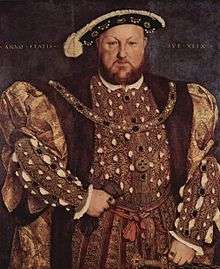

_-_02.jpg)




-00-inset-detail.jpg)

